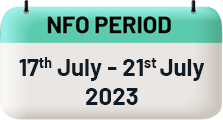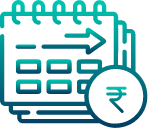

(An open ended scheme replicating/ tracking S&P BSE Sensex Index)

S&P BSE Sensex index has grown by a whooping 122x in the last ~37
years1

Companies forming part of the S&P BSE Sensex Index captures nearly about 40% of the total Indian equity market that is listed on the exchange1

The Index has the longest track record of the actual Indian Equity Market, with ~37 years of going live and 43 years in total2
This Index represents the top 30 companies selected basis float-adjusted market capitalization and liquidity. It rebalances every 6 months to represent the current largest companies and sectors.
The DSP S&P BSE Sensex ETF is an open ended scheme replicating/ tracking S&P BSE Sensex index. It invests in all the stocks of the S&P BSE Sensex index in the same proportion as that of the index.
If you are a first-timer or a relatively new equity market investor
If you want to invest in India (Indian Equity Markets)
If you understand that equity investing means exposure to risk.
If you value low-cost investing ideas
If you are okay with the returns being in line with benchmark index returns subject to tracking error
If you can stay invested for more than 5 years
Expect short term return fluctuations, especially during periods of market volatility
This is an index-matching strategy, so do not expect this to 'outperform' the market like active funds.
Returns of the fund will be lower than index returns due to expense ratio & tracking error
You need a trading account with a broker/ sub-broker
You also need a Demat account for holding the ETF units
Exchange Traded Funds, or ETFs, are a type of funds/schemes that track an index, sector, commodities or other assets, but which can be purchased or sold on the stock exchange like any regular stock. They combine the features and potential benefits of stocks or bonds and mutual funds. Like individual stocks, ETFs can be traded throughout the day at real time prices that change based on supply and demand.
Simplicity - Buying / Selling ETFs is as simple as buying / selling any other stock on the exchange.
Realtime Trading - ETFs allow investors to take benefit of intraday movements in the market, which is not possible with open-ended Funds.
Low cost - The cost of investing in ETFs is generally lower than an active fund invested in the same market of assets.
Seamless trading - Existing investors insulated from bearing transaction costs of other investors coming in or going out.
Transparency - Holdings published daily, so investor always knows exactly what is owned.
Mr. Anil Ghelani and Mr. Diipesh Shah will be the fund managers of the Scheme.
1 Source: Bloomberg. Data as on 30 June 2023. The figures pertain to performance of the index/Model and do not in any manner indicate the returns/performance of the Scheme. It is not possible to invest directly in an index.
2 Source: Internal, NSE, Bloomberg, DSP, Data as on Jun 2023.
During the NFO period, you can invest as low as Rs. 5,000/- and in multiples of Re.1/-. Note that unit allotment (if you invest during the NFO period) units will be issued at a premium approximately equal to the difference between face value and Allotment Price during the NFO and at NAV based prices on an on-going basis
Past performance may or may not be sustained in the future and should not be used as a basis for comparison with other investments. There is no assurance of any returns/capital protection/capital guarantee to the investors in above mentioned Schemes.
|
DSP S&P BSE Sensex ETF (An open ended scheme replicating/ tracking S&P BSE Sensex Index) |
This product is suitable for investor who are seeking*
|
|
||||||||
* Investors should consult their financial advisers if in doubt about whether the Scheme is suitable for them.
It is to be distinctly understood that the permission given by BSE Limited should not in any way be deemed or construed that the SID has been cleared or approved by BSE Limited nor does it certify the correctness or completeness of any of the contents of the SID. The investors are advised to refer to the SID for the full text of the Disclaimer clause of the BSE Limited.
It is to be distinctly understood that the permission given by NSE should not in any way be deemed or construed that the Scheme Information Document has been cleared or approved by NSE nor does it certify the correctness or completeness of any of the contents of the Draft Scheme Information Document. The investors are advised to refer to the Scheme Information Document for the full text of the ‘Disclaimer Clause of NSE’.